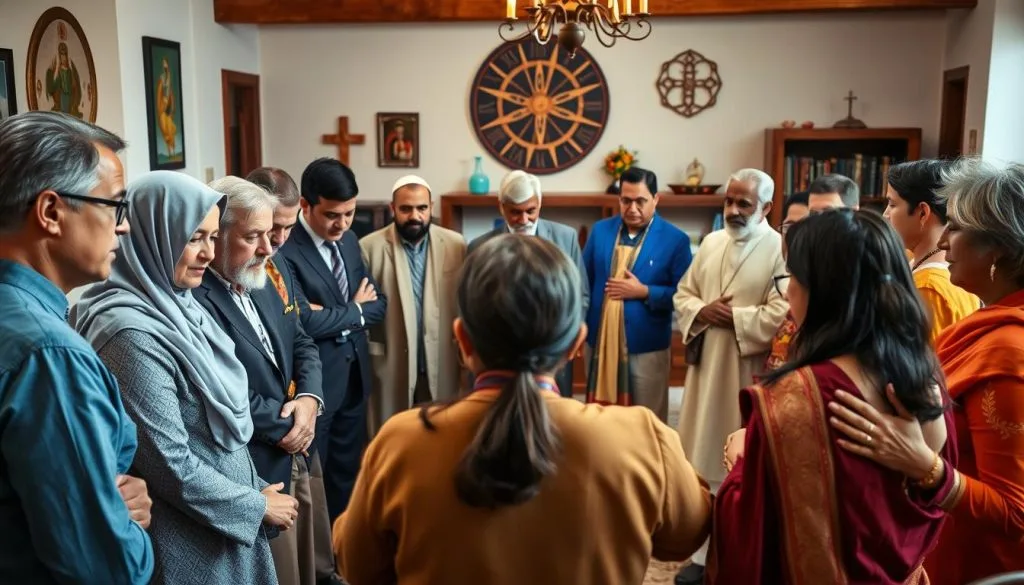Did you know that 1 in 5 adults in the U.S. experiences a health issue related to mental health each year? For many, these challenges are deeply tied to their sense of purpose and connection. Faith communities often play a vital role in providing care and support during these times.
Rabbi Simcha Weinstein, a trusted voice in this space, emphasizes the power of combining faith with professional treatment. Studies show that when faith leaders and therapists work together, recovery outcomes improve significantly. This partnership helps address issues like anxiety and depression more effectively.
Faith communities offer a unique space for healing. They provide resources, group support, and a sense of belonging. By integrating faith into health care, individuals can find strength and hope during crises. This approach not only aids recovery but also fosters long-term well-being.
Key Takeaways
- 1 in 5 adults in the U.S. faces mental health challenges annually.
- Faith communities provide essential care and support.
- Collaboration between faith leaders and therapists improves recovery outcomes.
- Faith-based approaches address anxiety and depression effectively.
- Integrating faith into treatment fosters long-term well-being.
Engaging Introduction: Stories, Scripture, and Statistics
The power of storytelling lies in its ability to connect and heal. Personal testimonies often reveal the strength found in faith and the journey toward recovery. These stories not only inspire but also reduce stigma, encouraging open discussions about health challenges.
Consider the story of Sarah, who struggled with anxiety for years. Through her faith community, she found a support group that helped her regain her sense of purpose. “My faith gave me the strength to seek help,” she shared. Stories like Sarah’s highlight the transformative power of faith and community.
Relatable Personal Testimonies
Personal experiences often resonate deeply within congregations. When individuals share their struggles and triumphs, it fosters a sense of connection and understanding. These testimonies remind us that no one is alone in their journey.
For example, Pastor Walrond Jr. often shares how his own experiences with depression shaped his ministry. “Faith doesn’t erase the pain, but it gives us the tools to cope,” he says. Such stories encourage others to seek help and embrace healing.
Biblical Perspectives on Healing and Resilience
The Bible is filled with verses that emphasize hope and resilience. Psalm 34:18 reminds us, “The Lord is close to the brokenhearted and saves those who are crushed in spirit.” These teachings provide comfort and guidance during difficult times.
Combining scripture with modern health practices can create a holistic approach to recovery. Faith-based counseling, for instance, integrates biblical principles with therapy to address both spiritual and emotional needs. This approach has been shown to improve outcomes for many individuals.
By blending personal stories with timeless wisdom, faith communities can offer a unique source of support. These narratives not only inspire but also pave the way for greater understanding and compassion.
Understanding Mental Health Challenges in Faith Contexts
Cultural beliefs often shape how health issues are perceived and addressed. In many faith settings, societal norms can create barriers to open discussions about health. These challenges are particularly evident in minority communities, where stigma and misconceptions persist.

Cultural and Societal Barriers
In some communities, outdated cultural norms discourage seeking help for health issues. For example, in African American churches, mental health challenges are often viewed as spiritual failings rather than medical conditions. This belief can prevent individuals from accessing the care they need.
Studies show that cultural stigmas are deeply ingrained. A systematic review highlighted that many people avoid treatment due to fear of judgment. This reluctance can delay recovery and worsen symptoms.
The Impact of Stigma and Misconceptions
Stigma often leads individuals to hide their struggles. Phrases like “pray it away” minimize the seriousness of health issues. This mindset can isolate those in need of support.
Research indicates that stigma disproportionately affects minority groups. For instance, Latino communities often face language barriers that limit access to resources. Addressing these challenges requires culturally sensitive approaches.
The Intersection of Faith and Mental Health Literacies
Faith and health literacy intersect in unique ways. Many individuals rely on their beliefs to cope with challenges. However, a lack of education about health issues can hinder effective coping strategies.
Integrating faith with health education can bridge this gap. Faith leaders can play a key role in providing accurate information. This approach fosters understanding and reduces stigma.
| Challenge | Solution |
|---|---|
| Cultural stigma | Education and awareness campaigns |
| Misconceptions | Faith-based counseling and resources |
| Lack of access | Community partnerships and outreach |
By addressing these barriers, faith communities can create a supportive environment. This foundation sets the stage for effective strategies to promote well-being.
Strategies for Promoting Mental Wellness in Faith Communities
Faith and health care can work hand in hand to create stronger communities. By blending spiritual guidance with clinical treatment, individuals can find holistic support for their needs. This approach not only addresses immediate challenges but also fosters long-term well-being.
Evidence-Based Approaches and Faith Integration
Studies show that combining faith with health treatment improves outcomes. For example, African American churches partnering with health services have seen significant success. These collaborations provide culturally sensitive care that respects personal beliefs.
Faith-based counseling integrates spiritual principles with therapy. This method helps individuals cope with challenges while staying true to their values. Research highlights that such approaches reduce stigma and encourage more people to seek help.
Building Collaborative Networks with Mental Health Professionals
Training clergy in health literacy is a key step. When faith leaders understand health issues, they can guide their communities effectively. Programs like Sunshine Connection have shown how these partnerships can transform lives.
Local networks are essential for sustained support. By connecting churches with therapists, communities can offer comprehensive care. These networks ensure that individuals have access to the resources they need.
| Strategy | Impact |
|---|---|
| Faith-based counseling | Reduces stigma, improves treatment outcomes |
| Clergy training | Enhances health literacy and support |
| Community partnerships | Provides access to resources and care |
Faith communities have a unique opportunity to lead in health care. By adopting these strategies, they can create a supportive environment for all. Together, faith and health professionals can make a lasting difference.
Incorporating DEI and Cultural Sensitivity in Mental Health Support
Creating a welcoming environment starts with understanding cultural differences. Faith communities are often diverse, and addressing health needs requires a thoughtful approach. By embracing diversity, equity, and inclusion (DEI), churches can ensure everyone feels supported in their journey.

Why Cultural Sensitivity Matters
Cultural sensitivity is essential for effective health support. Different communities have unique beliefs and practices that shape how they view health. For example, African American and Latino congregations often face specific challenges, such as stigma or language barriers. Tailoring programs to these needs can make a significant difference.
Initiatives like PEWS (Promoting Emotional Wellness in Spirituality) have shown success by aligning leadership with cultural values. These programs focus on education and outreach, helping reduce stigma and improve access to care. By understanding these dynamics, faith communities can create more inclusive spaces.
Practical Steps for Inclusive Practices
Here are actionable steps for church leaders to foster inclusivity:
- Provide Training: Educate clergy and volunteers on health literacy and cultural competence.
- Adapt Services: Offer bilingual resources or culturally relevant counseling.
- Engage the Community: Listen to the unique needs of minority groups and involve them in program design.
- Collaborate with Professionals: Partner with health experts to ensure evidence-based care.
For instance, some churches have introduced support groups that reflect the cultural backgrounds of their members. These groups provide a safe space for individuals to share their experiences and find strength in their beliefs.
Building a Supportive Environment
Adapting services to reflect diversity can reduce stigma and improve outcomes. When people see their culture and values represented, they are more likely to seek help. Faith communities have the unique opportunity to blend spiritual guidance with practical support, creating a holistic approach to health.
By examining their practices and fostering inclusivity, churches can become a beacon of hope and care. Let’s work together to ensure everyone feels welcome and supported in their health journey.
Conclusion
Faith and health intersect in powerful ways, offering hope and healing. By blending spiritual guidance with health care, faith communities can address challenges effectively. Culturally sensitive practices ensure everyone feels supported, reducing stigma and improving access to resources.
Collaboration between faith leaders and health professionals is key. Together, they can create a holistic approach that respects personal beliefs while providing evidence-based care. This partnership fosters a sense of belonging and purpose, which is essential for long-term well-being.
Let’s take action. Church leaders, health practitioners, and community members must work together to build healthier, more inclusive spaces. Explore additional resources and continue the conversation. Together, we can make a lasting impact.
